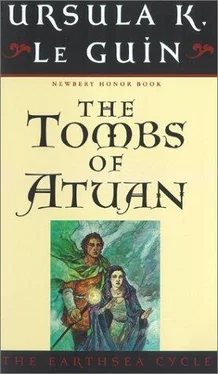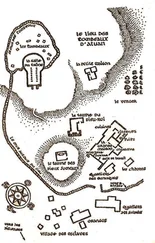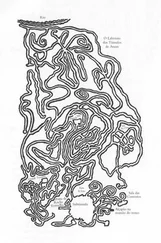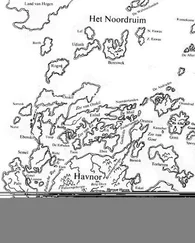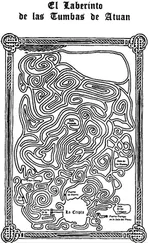Ursula Le Guin - The Tombs of Atuan
Здесь есть возможность читать онлайн «Ursula Le Guin - The Tombs of Atuan» весь текст электронной книги совершенно бесплатно (целиком полную версию без сокращений). В некоторых случаях можно слушать аудио, скачать через торрент в формате fb2 и присутствует краткое содержание. Жанр: Фэнтези, на английском языке. Описание произведения, (предисловие) а так же отзывы посетителей доступны на портале библиотеки ЛибКат.
- Название:The Tombs of Atuan
- Автор:
- Жанр:
- Год:неизвестен
- ISBN:нет данных
- Рейтинг книги:3 / 5. Голосов: 1
-
Избранное:Добавить в избранное
- Отзывы:
-
Ваша оценка:
- 60
- 1
- 2
- 3
- 4
- 5
The Tombs of Atuan: краткое содержание, описание и аннотация
Предлагаем к чтению аннотацию, описание, краткое содержание или предисловие (зависит от того, что написал сам автор книги «The Tombs of Atuan»). Если вы не нашли необходимую информацию о книге — напишите в комментариях, мы постараемся отыскать её.
The Tombs of Atuan — читать онлайн бесплатно полную книгу (весь текст) целиком
Ниже представлен текст книги, разбитый по страницам. Система сохранения места последней прочитанной страницы, позволяет с удобством читать онлайн бесплатно книгу «The Tombs of Atuan», без необходимости каждый раз заново искать на чём Вы остановились. Поставьте закладку, и сможете в любой момент перейти на страницу, на которой закончили чтение.
Интервал:
Закладка:
They both woke. The fire was dead. The stars she had watched were now far over the mountains and new ones had risen in the east. It was the cold that woke them, the dry cold of the desert night, the wind like a knife of ice. A veil of cloud was coming over the sky from the southwest.
The gathered firewood was almost gone. “Let's walk,” Ged said, “it's not long till dawn.” His teeth chattered so that she could hardly understand him. They set out, climbing the long slow slope westward. The bushes and rocks showed black in starlight, and it was as easy to walk as in the day. After a cold first while, the walking warmed them; they stopped crouching and shivering, and began to go easier. So by sunrise they were on the first rise of the western mountains, which had walled in Tenar's life till then.
They stopped in a grove of trees whose golden, quivering leaves still clung to the boughs. He told her they were aspens; she knew no trees but juniper, and the sickly poplars by the riversprings, and the forty apple trees of the orchard of the Place. A small bird among the aspens said “dee, dee,” in a small voice. Under the trees ran a stream, narrow but powerful, shouting, muscular over its rocks and falls, too hasty to freeze. Tenar was almost afraid of it. She was used to the desert where things are silent and move slowly: sluggish rivers, shadows of clouds, vultures circling.
They divided a piece of bread and a last crumbling bit of cheese for breakfast, rested a little, and went on.
By evening they were up high. It was overcast and windy, freezing weather. They camped in the valley of another stream, where there was plenty of wood, and this time built up a sturdy fire of logs by which they could keep fairly warm.
Tenar was happy. She had found a squirrel's cache of nuts, exposed by the falling of a hollow tree: a couple of pounds of fine walnuts and a smooth-shelled kind that Ged, not knowing the Kargish name, called ubir. She cracked them one by one between a flat stone and a hammerstone, and handed every second nutmeat to the man.
“I wish we could stay here,” she said, looking down at the windy, twilit valley between the hills. “I like this place.”
“This is a good place,” he agreed.
“People would never come here.”
“Not often… I was born in the mountains,” he said, “on the Mountain of Gont. We shall pass it, sailing to Havnor, if we take the northern way. It's beautiful to see it in winter, rising all white out of the sea, like a greater wave. My village was by just such a stream as this one. Where were you born, Tenar?”
“In the north of Atuan, in Entat, I think. I can't remember it.”
“They took you so young?”
“I was five. I remember a fire on a hearth, and… nothing else.”
He rubbed his jaw, which though it had acquired a sparse beard, was at least clean; despite the cold, both of them had washed in the mountain streams. He rubbed his jaw and looked thoughtful and severe. She watched him, and never could she have said what was in her heart as she watched him, in the firelight, in the mountain dusk.
“What are you going to do in Havnor?” he said, asking the question of the fire, not of her. “You are -more than I had realized– truly reborn.”
She nodded, smiling a little. She felt newborn.
“You should learn the language, at least.”
“Your language?”
“Yes.”
“I'd like to”
“Well, then. This is kabat,” and he tossed a little stone into the lap of her black robe.
“Kabat. Is that in the dragon-tongue?”
“No, no. You don't want to work spells, you want to talk with other men and women!”
“But what is a pebble in the dragon's tongue?”
“Tolk,” he said. “But I am not making you my apprentice sorcerer. I'm teaching you the language people speak in the Archipelago, the Inner Lands. I had to learn your language before I came here.”
“You speak it oddly.”
“No doubt. Now, arkemmi kabat,” and he held out his hands for her to give him the pebble.
“Must I go to Havnor?” she said.
“Where else would you go, Tenar?”
She hesitated.
“Havnor is a beautiful city,” he said. “And you bring it the ring, the sign of peace, the lost treasure. They'll welcome you in Havnor as a princess. They'll do you honor for the great gift you bring them, and bid you welcome, and make you welcome. They are a noble and generous people in that city. They'll call you the White Lady because of your fair skin, and they'll love you the more because you are so young. And because you are beautiful. You'll have a hundred dresses like the one I showed you by illusion, but real ones. You'll meet with praise, and gratitude, and love. You who have known nothing but solitude and envy and the dark.”
“There was Manan,” she said, defensive, her mouth trembling just a little. “He loved me and was kind to me, always. He protected me as well as he knew how, and I killed him for it; he fell into the black pit. I don't want to go to Havnor. I don't want to go there. I want to stay here.”
“Here– in Atuan?”
“In the mountains. Where we are now.”
“Tenar,” he said in his grave, quiet voice, “we'll stay then. I haven't my knife, and if it snows it will be hard. But so long as we can find food-”
“No. I know we can't stay. I'm merely being foolish,” Tenar said, and got up, scattering walnut shells, to lay new wood on the fire. She stood thin and very straight in her torn, dirt-stained gown and cloak of black. “All I know is of no use now,” she said, “and I haven't learned anything else. I will try to learn.”
Ged looked away, wincing as if in pain.
Next day they crossed the summit of the tawny range. In the pass a hard wind blew, with snow in it, stinging and blinding. It was not until they had come down a long way on the other side, out from under the snow clouds of the peaks, that Tenar saw the land beyond the mountain wall. It was all green– green of pines, of grasslands, of sown fields and fallows. Even in the dead of winter, when the thickets were bare and the forests full of gray boughs, it was a green land, humble and mild. They looked down on it from a high, rocky slant of the mountainside. Wordless, Ged pointed to the west, where the sun was getting low behind a thick cream and roil of clouds. The sun itself was hidden, but there was a glitter on the horizon, almost like the dazzle of the crystal walls of the Undertomb, a kind of joyous shimmering off on the edge of the world.
“What is that?” the girl said, and he: “The sea.”
Shortly afterward, she saw a less wonderful thing than that, but wonderful enough. They came on a road, and followed it; and it brought them by dusk into a village: ten or a dozen houses strung along the road. She looked at her companion in alarm when she realized they were coming among men. She looked, and did not see him. Beside her, in Ged's clothing, and with his gait, and in his shoes, strode another man. He had a white skin, and no beard. He glanced at her; his eyes were blue. He winked.
“Will I fool 'em?” he said. “How are your clothes?”
She looked down at herself. She had on a countrywoman's brown skirt and jacket, and a large red woolen shawl.
“Oh,” she said, stopping short. “Oh, you are– you are Ged!” As she said his name she saw him perfectly clearly, the dark, scarred face she knew, the dark eyes; yet there stood the milk-faced stranger.
“Don't say my true name before others. Nor will I say yours. We are brother and sister, come from Tenacbah. And I think I'll ask for a bite of supper if I see a kindly face.” He took her hand and they entered the village.
They left it next morning with full stomachs, after a pleasant sleep in a hayloft.
“Do Mages often beg?” asked Tenar, on the road between green fields, where goats and little spotted cattle grazed.
Читать дальшеИнтервал:
Закладка:
Похожие книги на «The Tombs of Atuan»
Представляем Вашему вниманию похожие книги на «The Tombs of Atuan» списком для выбора. Мы отобрали схожую по названию и смыслу литературу в надежде предоставить читателям больше вариантов отыскать новые, интересные, ещё непрочитанные произведения.
Обсуждение, отзывы о книге «The Tombs of Atuan» и просто собственные мнения читателей. Оставьте ваши комментарии, напишите, что Вы думаете о произведении, его смысле или главных героях. Укажите что конкретно понравилось, а что нет, и почему Вы так считаете.
